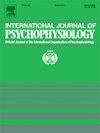Blunted neural response to real-life social reward anticipation in internet gaming disorder: An event-related potential study
IF 2.5
3区 心理学
Q3 NEUROSCIENCES
引用次数: 0
Abstract
Recent research indicates that individuals with Internet gaming disorder (IGD) exhibit impaired social reward processing, evidenced by reduced neural sensitivity to real-life social reward. The aim of the present study is to further investigate the impaired processing of social reward anticipation and reward consumption in individuals with IGD, and explore the relationship between these two components. Using a social incentive delay task with game-related and real-life versions, combined with event-related potential (ERP) technology, we examined 25 individuals with IGD and 25 matched healthy game players. The results showed that, at the behavioral level, individuals with IGD showed significantly slower reaction times to real-life target stimuli compared with game-related target stimuli, which is not observed in healthy controls. At the neural level, the Cue-P3 elicited by real-life incentive cues in individuals with IGD was significantly smaller than that elicited by game-related incentive cues. However, these effects were no longer significant after adding depression and anxiety scores as covariates. There was no significant difference in reward positivity (RewP) elicited between the two types of reward consumption. Furthermore, individuals with IGD showed a positive correlation between Cue-P3 elicited by game-related social incentive cue and RewP elicited by game-related social reward. However, this effect was not observed in the healthy controls. In conclusion, the present study suggests that the blunted allocation of motivated neural attention resources to real-life social incentive cues in individuals with IGD may be the key mechanism underlying their impaired social reward processing. This impairment may be influenced by the higher levels of depression and anxiety symptoms commonly observed in individuals with IGD.
网络游戏障碍患者对现实社会奖励预期的迟钝神经反应:一项事件相关电位研究。
最近的研究表明,患有网络游戏障碍(IGD)的个体表现出社会奖励处理受损,这可以通过神经对现实生活中的社会奖励的敏感度降低来证明。本研究旨在进一步探讨IGD患者社会奖励预期和奖励消费加工的受损情况,并探讨两者之间的关系。结合事件相关电位(event-related potential, ERP)技术,我们采用游戏相关和现实版本的社会激励延迟任务,对25名IGD患者和25名匹配的健康游戏玩家进行了研究。结果表明,在行为水平上,IGD个体对现实生活目标刺激的反应时间明显低于与游戏相关的目标刺激,这在健康对照组中没有观察到。在神经层面上,IGD个体被现实生活激励线索所激发的Cue-P3显著小于游戏相关激励线索所激发的Cue-P3。然而,在加入抑郁和焦虑分数作为协变量后,这些影响不再显著。两种类型的奖励消费所引起的奖励积极性(RewP)无显著差异。此外,IGD个体在游戏相关社会激励提示引起的cue - p3与游戏相关社会奖励引起的RewP之间存在正相关。然而,在健康对照中没有观察到这种效果。综上所述,本研究表明,IGD个体对现实社会激励线索的动机性神经注意资源分配的钝化可能是其社会奖励加工受损的关键机制。这种损害可能受到IGD患者常见的较高水平的抑郁和焦虑症状的影响。
本文章由计算机程序翻译,如有差异,请以英文原文为准。
求助全文
约1分钟内获得全文
求助全文
来源期刊
CiteScore
5.40
自引率
10.00%
发文量
177
审稿时长
3-8 weeks
期刊介绍:
The International Journal of Psychophysiology is the official journal of the International Organization of Psychophysiology, and provides a respected forum for the publication of high quality original contributions on all aspects of psychophysiology. The journal is interdisciplinary and aims to integrate the neurosciences and behavioral sciences. Empirical, theoretical, and review articles are encouraged in the following areas:
• Cerebral psychophysiology: including functional brain mapping and neuroimaging with Event-Related Potentials (ERPs), Positron Emission Tomography (PET), Functional Magnetic Resonance Imaging (fMRI) and Electroencephalographic studies.
• Autonomic functions: including bilateral electrodermal activity, pupillometry and blood volume changes.
• Cardiovascular Psychophysiology:including studies of blood pressure, cardiac functioning and respiration.
• Somatic psychophysiology: including muscle activity, eye movements and eye blinks.

 求助内容:
求助内容: 应助结果提醒方式:
应助结果提醒方式:


